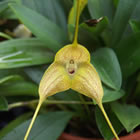Orchids Prefer High Humidity
Humidity measures the amount of water vapor circulating in the air. Orchids need high humidity (50%-75%) all the time. Plant leaves have microscopic openings that "breathe in" water vapor and oxygen. Even during winter dormancy, orchids still want moderate humidity around their leaves and roots. As temperatures rise, orchids need increasing humidity to cope with the heat. Direct sun can heat up an area very quickly; the afternoon sun especially can dry out the air. Wind also dries out plant leaves, and even though they enjoy the air movement, this must be balanced with high humidity.
- 5 methods to raise humidity:
- Mist the leaves with a spray bottle to raise humidity levels. Avoid misting with tap water, since chemicals in it may damage the leaves. Use rainwater or purified water instead.
- Place a tray of pebbles and water under the pot to raise humidity. Never let the flowerpot sit in water; instead, raise the pot on pebbles to keep it above the water level. If the pot sits in water, the roots will rot. Be sure to change the water at least twice a week to keep it clean and prevent mosquitoes.
- Put the orchid near a fountain. The moving water will evaporate and raise the humidity nearby.
- Group several orchids together. During the day, leaves transpire and release water vapor, humidifying the air. Plants in a group can create a small, humid area around one another.
- Use a humidifier. Only use the kind that blows cool mist, not steam.
Air Movement Is Important
We may think of damp jungles and forests as places where the air is still, but in nature orchid leaves and roots are exposed to both mild breezes and strong winds. Keep plants near an open window or a fan to provide some gentle air movement. Be careful not to blow all the humidity away. Stagnant air will encourage pests and germs that can kill a plant. Orchids such as Masdevallias and Odontoglossums need constant cool, moist breezes.
Orchids Need Good Air Quality
Some orchids may be sensitive to airborne pollutants, or sensitive to ethylene. Ethylene is an odorless, invisible gas that comes from ripening fruit or some kinds of smoke, including cigarette smoke. Keep plants away from ripening fruit, stoves, and heaters. Regular air movement will help. If you live in a polluted area, you may want to experiment with different kinds of orchids to find the ones that can survive with poor air quality.

